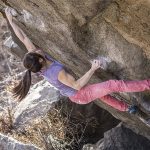Despite strong opposition in the House of Representatives and the threat of a government shutdown, most leaders in the outdoor recreation community continue urging the U.S. Congress to maintain or substantially increase federal spending on key programs like the Land and Water Conservation Fund.
From the Outdoor Industry Association to Bikes Belong and the National Association of State Park Directors, the community’s trade associations and user groups are charging ahead with their message that investing in bike lanes, hiking trails, campgrounds and habitat preservation is a wise investment in an era of shrinking federal resources and rising obesity rates, gas prices and urbanization.
“There is an intense focus on cutting the budget and a heightened focus on job creation and making sure policy is stimulating small business activity,” said Amy Roberts, director of government affairs for Outdoor Industry Association. “You have to make the case for why recreation infrastructure supports economic vitality in local communities.”
Perhaps the best indication of how much the climate has changed since the mid-term election is House Resolution 1, or HR1. Passed in February without a single vote from Democrats. HR 1 would gut funding for several programs that benefit outdoor recreation companies and enthusiasts in a bid to reduce spending in the current fiscal year by $100 billion. (See sidebar page 3) Even some hunting and fishing groups, which have traditionally had stronger ties to the Republican party and been less strident in their environmental demands, have condemned HR 1 as an attack on conservation.
“It takes a deadly axe to fish, wildlife, and sportsmen's programs while leaving unscathed habitat-consuming industries like oil and gas,” reads an editorial penned last week by Field & Stream magazine’s Conservation Editor, Bob Marshall. “In fact, many sections will not lower the deficit but simply take aim at environmental laws that polluting industries have opposed for years-laws that sportsmen's groups support because of their ultimate impact on fish and wildlife habitat.”
The Senate rejected HR 1 and the two houses are now trying to come to an agreement on a continuing budget resolution or temporary budget bill – to head off a possible shut down of the federal government next month.
However, there were few signs of compromise last week, according to Virginia State Parks Director Joe Elton, who traveled to Washington Wednesday with hundreds of local and state park directors for the National Recreation and Parks Association’s National Legislative Forum. “Nobody has blinked yet,” said Elton of Democratic leaders in the Senate and Republicans in the House. “There is an enormous amount of uncertainty.”
Elton, who serves as president of the National Association of State Park Directors, said Republican leaders remain adamantly opposed to proposals to fully fund of the Land and Water Conservation Fund (LWCF). The federal government had leveraged the fund up to four-fold with local and state money to build nearly 40,000 state and local park and recreation projects in all 50 states. Although Congress can appropriate up to $900 million a year of revenues from offshore oil and gas leases to LWCF, it has only done so twice in the program’s 45-year history.
In a meeting last week with local and state park directors, U.S. Secretary of the Interior Ken Salazar outlined the Administration’s proposal to fully fund the LWCF, but give states less input to how the money is spent. The approach has the support of many in conservation and environmental circles, but Elton said it amounts to an-all-or-nothing gamble that puts millions of dollars in federal funding at risk.
“There was a general feeling that what they were proposing could not be sold in the House,” Elton recalled of the meeting. Elton said he thinks House Republicans would look more favorably on a proposal to boost stateside funding in LWCF because it would put more spending decisions – and concentrate more of their economic impact – in the hands of local communities.
Most of the outdoor recreation community, however, supports full funding for LWCF. Lobbyists and government affairs directors for industry and user groups said Republican leaders in the House are receptive to their economic message.
“We are doing a better job of explaining the bang for the buck we provide in this era of performance-based accountability,” said Tim Rosenthal, president and director of Bikes Belong Coalition, which led a delegation of 800 to Washington D.C. earlier in the month for National Bike Summit. “They want everything to undergo a cost benefit analysis and we say bring it on.”
Bikes Belong has emphasized the economic benefits of investing in bicycling infrastructure for years, but crafted a new “Bikes Mean Business” message last fall as the mid-term elections became more focused on the growth of the federal deficit. Still, the coalition was shocked when one of its biggest champions in the House, Wisconsin Democrat Jim Oberstar, was defeated after 36 years in Congress. As chairman of the House Transportation Committee and House Transportation Infrastructure Subcommittee, Oberstar helped steer hundreds of millions of dollars toward the construction of bike trails and lanes through the Safe Routes to School and other programs.
At the National Bike Summit, cycling advocates focused on how cycling provides a low cost solution to many of the country’s challenges, from obesity and traffic congestion to dependence on foreign oil. The fact that John Mica (R-FL), the new chairman of the House Transportation Committee, and Steven LaTourette (R-OH), Tom Latham (R-IA) and Jack Kingston, (R-GA) of the House Appropriations Committee, met with delegates during the National Bike Summit indicates they are open to Bikes Belong’s message.
“If I sound optimistic and upbeat, it’s because I realize that new members of Congress who represent the Tea Party interests came in with a lot of bravado,” said Rosenthal. “But the actual act of governing will require them to be more moderate and they will have to get down to the very, very difficult job of reconciling what their constituents want with what they want to cut.”
The International Mountain Biking Association (IMBA) dialed back its ask at the National Bike Summit by asking Congress to maintain, rather than increase, spending on the Recreational Trails Program. The program has pumped $780 million into the construction and maintenance of mountain biking and hiking trails in all 50 states since 1993. IMBA’s delegation arrived for their meetings with Congressmen or their staff with data on the number of RTP grants awarded in their district, how the grants were leveraged up to four times with local money and how they helped create projects that improved access to public land and create jobs in their district.
IMBA Executive Director Mike Van Abel said that while its clear federal funding for public lands will decrease in the 112th Congress, he sees “amazing opportunities” to partner with the Bureau of Land Management to build more trails and grow the sport. He said pure conservation groups are at a disadvantage in the House, where the current chairman of the Natural Resources Committee, Doc Hasting (R-WA) is a big proponent of exploiting public lands to boost domestic energy production and generate jobs. That makes Hastings open to economic arguments about how spending on public lands contributes to rural tourism and jobs.
At its annual Capitol Summit next month, OIA will shift its emphasis from advocating for specific appropriations for individual programs at the Forest Service, the Bureau of Land Management and the National Park Service and toward securing a long-term commitment to full funding of the LWCF.
“The argument is that the money is already there,” noted OIA’s Roberts in reference to the oil and gas lease revenues that have already been earmarked for the fund. “It’s not asking them to fund a new program.”
OIA will also advocate less for preserving wild landscapes and shift its emphasis toward projects that will drive jobs in local communities.
For those planning on meeting with their local Congressman or their staff, Rosenthal has some simple advice.
“Keep the message very short, emphasize business and realize that 80% of 435 members of the House of Representatives are moderate and understand the benefits of what you are asking.”
Indeed, the one thing that has not changed in Washington since the mid-term elections is the influence of constituents.
“What we need right now is for Congressmen to hear from their constituents,” said an aide to one of the outdoor industry’s biggest champions in the U.S. House of Representatives. “A lot of the new members are not listening to the national groups. They are listening to their local districts, so it's really important that people come and talk to them about what these cuts mean for their district and state. There are absolutely going to be cuts, but making them aware of how those cuts will affect their district will make them think about it.”















